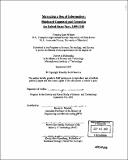Managing a sea of information : shipboard command and control in the United States Navy, 1899-1945
Author(s)
Wolters, Timothy Scott, 1965-
DownloadFull printable version (18.58Mb)
Other Contributors
Massachusetts Institute of Technology. Program in Science, Technology and Society.
Advisor
David A. Mindell, Merritt Roe Smith and David Alan Rosenberg.
Terms of use
Metadata
Show full item recordAbstract
This dissertation traces the history of shipboard command and control systems in the United States Navy from 1899, when the service first conducted experiments with wireless telegraphy, through World War II, the conflict which witnessed the birth of the modern shipboard information processing facility. It argues that early-to-mid twentieth century naval officers' development and employment of increasingly sophisticated shipboard command and control systems fundamentally altered the human experience of warfare at sea. Based predominately on archival research, Managing a Sea of Information follows a narrative format. It begins by examining the United States Navy's adoption of radio and challenges the notion that a conservative officer corps failed to appreciate the potential advantages of this new communications technology. The bulk of the study explores the Navy' s development of shipboard command and control systems from World War I through the beginning of World War II, focusing particularly on the efforts of operational commanders to maximize their capabilities through the adoption of devices, methods, and procedures for the collection, processing, and dissemination of information. These efforts gradually changed the nature of command at sea, from an environment in which commanders could make informed tactical decisions with relatively limited input from subordinates, to one characterized by epistemic actions and socially-distributed cognition. The dissertation concludes with a brief analysis of shipboard command and control systems during the Second World War, concentrating especially on the United States Navy's creation of the Combat Information Center (CIC).
Description
Thesis (Ph. D.)--Massachusetts Institute of Technology, Program in Science, Technology and Society, 2003. "September 2003." Includes bibliographical references (leaves 263-294).
Date issued
2003Department
Massachusetts Institute of Technology. Program in Science, Technology and SocietyPublisher
Massachusetts Institute of Technology
Keywords
Program in Science, Technology and Society.